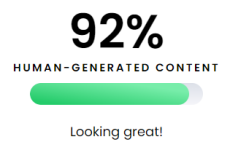Rob_Royale
with cheese
- Joined
- Aug 8, 2022
- Posts
- 6,244
This would require someone who has the full paid version of Grammarly (which I don't) and a story where Grammarly wasn't used. I'm very curious just how much of a change the full version of Grammarly would have on AI detection.
So.
1. Use this AI content detector - https://writer.com/ai-content-detector/
2. Put the first 5K words of the story through that detector. Record the result, given as a percentage of being human generated.
3. Create a second copy of your story that you can play with without messing up your original.
4. Then run that copy through the full paid Grammarly checker and accept all changes. Grammar, word use, sentence structure, the works.
5. Then put the first 5K words through the AI detector again and record the new result.
6. Post results.
I realize this will vary from writer to writer, but if everyone who feels like participating uses the same AI detector and full Grammarly it might shed a little light on just how much effect it has on getting flagged for AI. And it will either confirm our fears about Grammarly or assuage them.

So.
1. Use this AI content detector - https://writer.com/ai-content-detector/
2. Put the first 5K words of the story through that detector. Record the result, given as a percentage of being human generated.
3. Create a second copy of your story that you can play with without messing up your original.
4. Then run that copy through the full paid Grammarly checker and accept all changes. Grammar, word use, sentence structure, the works.
5. Then put the first 5K words through the AI detector again and record the new result.
6. Post results.
I realize this will vary from writer to writer, but if everyone who feels like participating uses the same AI detector and full Grammarly it might shed a little light on just how much effect it has on getting flagged for AI. And it will either confirm our fears about Grammarly or assuage them.
